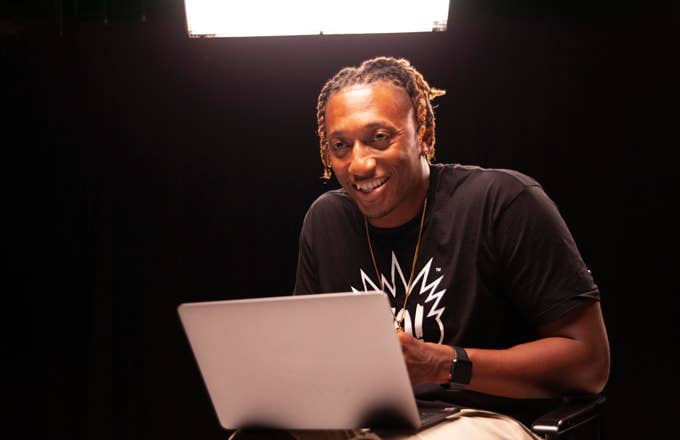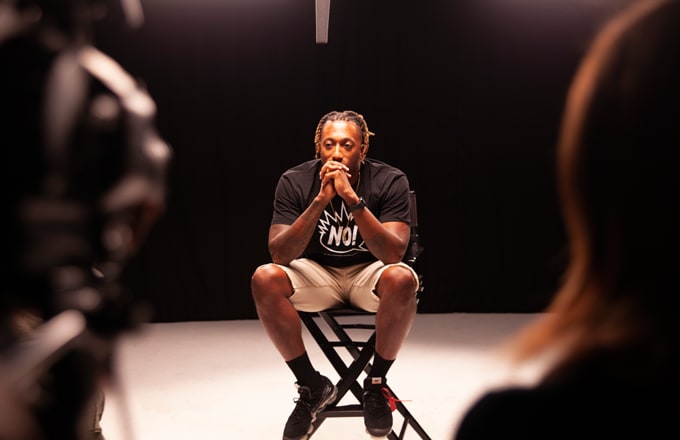Sure of himself in a way most other rappers wish they were, Lecrae is many things: a devout Christian who rejects the idea of being anyone’s prophet, a Black man who speaks unashamedly of being raised by a single mother and the importance of fatherhood, and a nearly 40-year-old musician awaiting his impending ruby birthday without crisis.
Lecrae, as a man, sits atop a solid foundation of conviction and belief, firmly rooted in the earth. After receiving DNA results from Ancestry detailing his ethnic heritage, the father of three found out just how far those roots travel. Discovering that 35% of his ethnic composition stems from Central Africa (Cameroon, Congo, Southern Bantu Peoples), while another 45% percent can be traced back to West Africa (Benin/Togo, Ivory Coast/Ghana, Nigeria, Mali), Lecrae is now able to trace his lineage back to specific countries instead of ambiguously referencing an entire continent, something many African Americans unfortunately have to resort to.


Even before discovering his origins, the already well-traveled rapper touched fans from all walks of life. His latest album, Let the Trap Say Amen—a collaboration with Atlanta producer Zaytoven—was released in June to positive reviews and debuted at number one on Billboard’s Top Christian Albums chart that month. And while he’s certainly focused on how wide his message can spread, he took some time to speak to Complex and reflect on the elements that formed that message in the first place.
You had that great quote a couple of years ago: “Christian's a great noun, not a great adjective.”
I think it describes me as far as what I believe. But it doesn't describe what I do. I didn't get up this morning [and say] I gotta put on my Christian shirt. You know what I mean? It's a weird thing to make it an adjective.
As a man of faith are you curious about the religions of some of the regions you’re from?
I feel like faith, in a lot of ways—especially in America—is a greenhouse. And I was not raised in a greenhouse; I was raised in the rainforest. So I learned how to function in a greenhouse, but I'm more comfortable in the rainforest. I thrive out in the wilderness and I respect what's happening in the greenhouse—it's just not what I'm accustomed to.
Understanding my roots and my history, I think it has me intrigued. I think, regardless of your belief, there's something we can all learn from each other. I'm sure there are some brilliant things about them and who they are and what they know that I could learn from and benefit from.
In addition to your religious background, you also grew up with a strong, socially conscious mother.
My mom was gangster, man. She instilled a sense of self-pride and cultural heritage and, and just a belief that my blackness was not something to be ashamed of—especially in society where you don't see a lot of people of color in positions of power and influence outside of athletes [and] entertainers...which, I ended up being an entertainer, but hey we're not gonna go there.
She just helped me to have a sense of pride about who I was and where I'm from, and that there's something redeemable and respectable about every person in their history, or their roots, or their culture. For me, that's exciting because when I dig back in, I can pinpoint even more about where my ancestors came from. Then I can learn about some historical figures and some influential people, and just let my kids know, and let my grandkids know, and great-grandkids know [that] this person's blood runs through your veins.
Your three kids are 10, nine and six. They’re at the ages where they’re asking questions like this. What are you going to bring back to them about today?
I want them to take a DNA test. But more than anything, I think it's important that I take them to West Africa. As they get more acclimated and understand who they are as Americans—and as Black Americans or African Americans—it's like alright, let's take it a step back and go to Africa and understand that’s where 80% of your dad's DNA comes from.
Something else you’ve spoken about is not knowing your dad when you were growing up. What do these results mean in regards to that? Especially now that you have children of your own.
I think it's important to know your history and know where you're from. It would be great to know my dad. It'd be great to understand his dynamics, and his characteristics, and his family and how that plays into who I am.
But I think I benefit by being a father because I get to create a new normal. I get to start from scratch in a lot of ways. My son can [say] that's me acting like [my] dad, [or] I got this from mom. We get to become those figureheads in our family lineage.
This inspires me to wanna journal and document stuff so that 2000 years from now my descendants won't [say] “ I don't know where we came from.”
